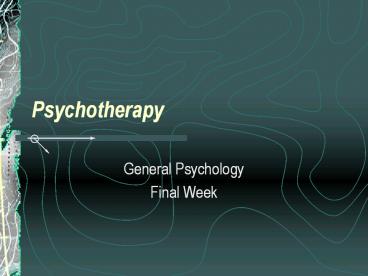Psychotherapy - PowerPoint PPT Presentation
Title:
Psychotherapy
Description:
Rational Emotive Therapy (Ellis) - recognize and reject irrational thinking ' ... Rational Emotive Therapy. Attempts to modify the irrational beliefs that cause ... – PowerPoint PPT presentation
Number of Views:1803
Avg rating:3.0/5.0
Title: Psychotherapy
1
Psychotherapy
- General Psychology
- Final Week
2
Chapter Outline
- Psychotherapy
- Psychodynamic
- Humanistic
- Behavioral
- Cognitive
- Group Therapy
- Marital and Family Therapy
- Drug Therapy
- Efficacy of Therapy
- Course evaluation
3
Therapy
- What are the different types of therapy?
- Does psychotherapy really work?
- Which therapies are most effective?
- What type of drugs are used in the treatment of
psychological disorders?
4
Psychodynamic Therapy
- Psychotherapy Procedure in which a trained
person provides talk therapy for an individual
seeking help - Psychodynamic- disorders stem from hidden inner
conflicts - Psychoanalysis- provide insight into hidden inner
conflicts by bringing them to the surface - free association- say whatever comes to mind
- resistance- refusal to report certain thoughts
- transference- intense feelings of love or hate
toward the analyst
5
Goals of psychoanalysis
6
Humanistic Therapy
- Humanistic Therapy- disorders stem from factors
in environment that block personal growth - Client-centered therapy- focus on eliminating
unrealistic conditions of worth (distorted
self-concept) - unconditional positive regard- full acceptance
- empathetic understanding- psychological mirror
- Gestalt therapy- focus on personal wholeness
- two-chair technique- client assumes role of self
and some important person in their life
7
Behavior Therapy
- Behavior Therapy- disorders stem from faulty
learning (maladaptive habits) - Therapies based on Classical Conditioning
- systematic desensitization- associate relaxation
with feared object - Therapies based on Operant Conditioning
- token economies- earn tokens for desirable
behavior - Therapies based on Observational Learning
- modeling- acquire new skills by observing others
8
Cognitive Therapies
- Cognitive Therapy- disorders stem from distorted
patterns of thought - Rational Emotive Therapy (Ellis) - recognize and
reject irrational thinking - Everyone should like me
- If I dont get that promotion. my career is
over - Cognitive Behavior Therapy (Beck) - recognize and
change illogical patterns of thought (e.g.,
overgeneralize setbacks) that underlie depression
9
Rational Emotive Therapy
- Attempts to modify the irrational beliefs that
cause distress - Confrontational and directive
- Common Irrational Beliefs
- I must be perfect
- Everyone must love me
- The past determines the future
- It is catastrophic when things don't go as
planned - I have no control over my happiness
- Perfect solutions must be found for life's
problems - Happiness just happens
10
Becks Cognitive Therapy
- Automatic Thoughts Thoughts people have about
life and the self that may be unreasonable but
are accepted as accurate - Automatic thoughts create depression and anxiety
- Goal teach patients to stop the thoughts
- Also involves negative views of past, present,
and future experiences - Highly effective treatment for depression
anxiety
11
Group Therapies
- Note many are closely linked to psychotherapies
- Psychodynamic Group Therapy- help bring inner
conflicts into consciousness - psychodrama- act out problems in front of group
- Behavioral Group Therapy- change specific
behaviors (social skills, assertiveness,
self-control) - Humanistic Group Therapy- enhance personal growth
and self-knowledge - sensitivity training groups
- Self-Help Groups- support groups who share common
problem (e.g., AA)
12
Marital and Family Therapy
- Marital (Couple) Therapy- designed to help
couples improve relationship (communication) - role-playing, watching videos of their own
interactions - Family Systems Therapy- focus is on family
dynamics in which each member has a role - improve relations between family members
13
Efficacy Studies
- Efficacy Studies- Controlled research designed to
test the effectiveness of different types of
therapy - Important Criteria
- inclusion of experimental (receive therapy) and
control group (receive no therapy) - random assignment to therapy/no therapy
conditions - rigorous controls- avoid placebo effects
- trained therapists using standardized procedures
- well-trained blind raters
14
Is Psychotherapy Effective?
- Conclusions
- over 500 reviews suggest that therapy is more
effective than no therapy - the longer therapy goes, the greater improvement
- more people report improvements after receiving
treatment from psychiatrists/psychologists than
general physicians - psychotherapies are roughly equal in
effectiveness - many therapists use an eclectic approach
15
Biomedical Therapy
- Drug Therapy
- Antipsychotic- reduce hallucinations/delusions
- Clozapine- block dopamine receptors in the brain
- Antidepressants- counter depression
- Prozac- increase the action of serotonin in the
brain - Antibipolar (Lithium)- counter manic-depression
- Antianxiety- reduce anxiety
- Valium- inhibit the CNS in the brain, activates
GABA - ECT- shocks to brain used to treat severe
depression - controversial - Psychosurgery- brain surgery (lobotomy)
16
Prevention
- Community Mental Health Centers provide
- Affordable mental health treatment
- aftercare for outpatients
- emergency services- crises intervention
- prevention strategies
- Primary- prevent occurrence of disorders
- risks of drug use, anger management
- Secondary- detect problems early before they
escalate - diversion programs- steer offenders away from
dangers - Tertiary- minimize long-term harm from disorders
- training in custodial care





















![[PDF] Psychotherapy Fundamentals: Complete Guide (Psychology and Psychotherapy: Theories and Practices Book 1) Kindle Edition Kindle PowerPoint PPT Presentation](https://s3.amazonaws.com/images.powershow.com/10094160.th0.jpg?_=20240808095)









